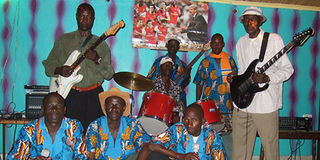At 70, Nzenze still holds on to his guitar

Musician John Nzenze (Right) with his band. PHOTO/ BENSON AMADALA
What you need to know:
- He has been in the entertainment world for 50 years but has little to show for it
His songs have endeared him to many music lovers in Kenyan and beyond the borders for the past 50 years and yet the legendary crooner has little to show for it.
At 70 years, John Amutavi Nzenze is no doubt in the twilight of a music career full of dashed hopes and disappointment.
Like several of his contemporaries, Nzenze is struggling to shake off the tribulations which have beset local musicians and driven them into oblivion despite their rich contribution to the music industry.
Last week, Nzenze was among four local musicians picked for the prestigious Head of State Commendation awards in recognition of their contribution to the industry.
Musicians feted
Other musicians feted were John Katana of “Them Mushrooms”, David Ndung’u and Conrad Karukenya.
But the elderly songster was unflattered by the gesture and thinks the Government should have done more in recognition of efforts to promote local music.
Nzenze’s contemporaries include Isaiah Mwinamo, Daudi Kabaka, John Mwale and George Mukabi.
Others are Reuben Shimbilo, Tom Miti, Edward Nandwa and George Agada who had their illustrious music careers clouded in endless struggles for survival with little income to show for their efforts.
Born in 1940 in Nairobi’s Muthurwa estate, Nzenze won the hearts of many with his captivating compositions which include his popular 1961 hit song Angelike.
The singer has also promoted the lively “twist” dance style in his songs, adding a kick to his charming and sentimental compositions. He has performed in many countries including Uganda, Tanzania, Ethiopia and Algeria. He has also visited Japan and Britain.
Although he continues to bubble with verve and the exuberance that has kept him going strong over the years, he says the plight of local musicians and other artists should be addressed.
“When I received the phone call informing me that I had been picked for the HSC award, I felt excited but my heart sunk when we only received a medal in recognition for our effort,” said Nzenze in an interview in Kakamega.
He said local musicians were exploited by promoters and left to languish in poverty and appealed to the Government to intervene to check piracy and infringement of copy right.
At the peak of his career in 1968, Nzenze and his group represented the country in the All African Music Festival in Algeria and finished in a respectable third position after putting up a splendid show.
On their return, the group was feted by President Jomo Kenyatta and later received an invitation to perform in Addis Ababa before Emperor Haile Selassie.
For three months, Nzenze and his colleagues at the Air Fiesta Matata band got lavish treatment in Ethiopia as they belted out their enticing tunes and wowed the monarch during their stay.
During the memorable performance in Algiers, Nzenze recalled meeting the former vocalist with Franco’s TPOK Jazz Papa Noel whom he admires a lot.
But perhaps it is the Congolese music maestro Dr Nico Kassandah who left a lasting impression on Nzenze with his dazzling plucking of the guitar.
He was first drawn to music after watching his father play the guitar he bought while working at the former Kenya-Uganda railways company. At 12, Nzenze could no longer resist the temptation to learn playing the guitar after watching his father deftly strum the wires.
Whenever his father was away, he would play the guitar with the help of a friend until he mastered the instrument.
But his father was so disappointed when he learnt that his son was spending much of his time learning music instead of reading and decided to sell the guitar.
After attending St Peter’s primary school, Nzenze got a job at the Norfolk Hotel and later teamed up with Daudi Kabaka who was working at the Stanley Hotel. The two would meet in the evening and practise how to sing and play the guitar in a hotel room. Their efforts were rewarded after three songs which Kabaka had composed found their way into a studio.
The songs, Masista, Bachelor Boy, and Nyumba za Tobacco became instant hits after they were released by Jambo Records.
By then, Nzenze had become polished at playing rhythm and solo guitar and decided to try out his luck on his own.
Hit song
When his famous Angelike hit song got to the market, Nzenze’s fortunes took a dramatic turn with music producers knocking at his doorstep.
He formed a group comprising John Mwale, John Lwangu, Joseph Abass and John Miti and parted ways with Kabaka after they signed a contract with the African Gramophone Store (AGS).
The group later moved to Kampala and also performed in Dar es Salaam, Arusha, and Tanga for five years.
In 1972, the group got another invitation from the British Broadcasting Corporation (BBC) to perform in London. Unfortunately, the London trip was dogged by misfortunes forcing Nzenze and his colleagues to part ways.
Nzenze opted to return home and ended up at the Panafric Hotel where he spent 10 years singing and playing the guitar to entertain visiting tourists.
A Japanese tourist who was impressed by his performance took him on to entertain tourists on a ship from Asia to East Africa. When the contract ended in 2004, he decided to pack his bags and go back to his rural village in Shaviringa, Hamisi district, hoping to settle down to a quiet life.
Nzenze, who now plays at Westlife club in Kakamega, plans to release new songs by August.




